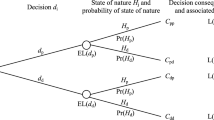Abstract
This paper argues the thesis that a particular style of reasoning, qualitative comparative reasoning (QCR), plays a role in at least three areas of legal reasoning that are central in AI and law research, namely legal theory construction, case-based reasoning in the form of case comparison, and legal proof. The paper gives an informal exposition of one particular way to deal with QCR, based on the author’s previous work on reason-based logic (RBL). Then it contains a substantially adapted formalisation of RBL, to make RBL suitable for dealing with QCR. The paper concludes with a brief discussion of related work.
Similar content being viewed by others
References
C. E. Alchourrón E. Bulygin (1971) Normative Systems Springer Wien
Aleven, V. (1997). Teaching Case-Based Argumentation through a Model and Examples. PhD-thesis Pittsburgh.
Alexy, R. (1979). Zum Begriff des Rechtprinzips, Rechtstheorie, Beiheft 1, pp. 59–87.
R. Alexy (1996) Theorie der Grundrechten, 3e Auflage Suhrkamp Frankfurt a/M
R. Alexy (2000) ArticleTitleOn the Structure of Legal Principles Ratio Juris 13 IssueID3 294–304 Occurrence Handle10.1111/1467-9337.00157
R. Alexy (2003) ArticleTitleOn Balancing and Subsumption. A Structural Comparison Ratio Juris 16 IssueID3 433–449
K. D. Ashley (1990) Modeling Legal Argument: Reasoning with Cases and Hypotheticals MIT-Press Cambridge
K. D. Ashley (1991) ArticleTitleReasoning with Cases and Hypotheticals in HYPO International Journal of Man-Machine Studies 34 753–796 Occurrence Handle10.1016/0020-7373(91)90011-U
K. D. Ashley (1992) ArticleTitleCase-Based Reasoning and its implications for Legal Expert Systems Artificial Intelligence and Law 1 IssueID2–3 113–208
T. J. M. Bench-Capon (2000) ArticleTitleThe Missing Link Revisited: The Role of Teleology in Representing Legal Argument Artificial Intelligence and Law 10 94–97
T. J. M. Bench-Capon E. L. Rissland (2001) Back to the Future: Dimensions Revisited H. B. Verheij (Eds) et al. Proceedings Jurix 2001 IOS Press Amsterdam 41–52
T. J. M. Bench-Capon G. Sartor (2000) Using Values and Theories to Resolve Disagreement in Law J. Breuker (Eds) et al. Proceedings of the Thirteenth Jurix Conference IOS Press Amsterdam 73–84
T. J. M. Bench-Capon G. Sartor (2003) ArticleTitleA Model of Legal Reasoning with Cases Incorporating Theories and Values Artificial Intelligence 150 97–143 Occurrence Handle10.1016/S0004-3702(03)00108-5
D. H. Berman C. Hafner (1993) Representing Teleological Structure in Case-Based Legal Reasoning: The Missing Link ACM New York 50–59
F. Bex H. Prakken C. Reed D. Walton (2003) ArticleTitleTowards a Formal Account of Reasoning about Evidence: Argumentation Schemes and Generalisations Artificial Intelligence and Law 11 IssueID2–3 125–165
Brewka, G. and Gordon, T. F. (1994). How to Buy a Porsche, an Approach to Defeasible Decision Making. In Working Notes of the AAAI-94 Workshop on Computational Dialectics Seattle, Washington, pp. 28–38.
R. Dworkin (1978) Taking Rights Seriously EditionNumber2 Duckworth London
R. Dworkin (1985) A Matter of Principle Clarendon Press Oxford
R. Dworkin (1986) Laws Empire Fontana London
K. Freeman A. M. Farley (1996) ArticleTitleA Model of Argumentation and Its Application to Legal Reasoning Artificial Intelligence and Law 4 IssueID3–4 163–197
T. F. Gordon N. Karacapilidis (1997) The Zeno Argumentation Framework ACM New York 10–18
J. C. Hage (1996) ArticleTitleA Model of Legal Reasoning and a Logic to Match Artificial Intelligence and Law 4 IssueID3–4 199–273
J. C. Hage (1997) Reasoning with Rules Kluwer Dordrecht
J. C. Hage (2000) Goal-based Theory Evaluation J. Breuker (Eds) et al. Proceedings of the Thirteenth Jurix Conference IOS Press Amsterdam 59–72
J. C. Hage (2001) Formalizing Legal Coherence ACM New York 22–31
J. C. Hage G. Sartor (2003) ArticleTitleLegal Theory Construction Associations 7 IssueID3 171–184
J. C. Hage (2005) Studies in Legal Logic Springer Berlin
R. M. Hare (1963) Freedom and Reason Oxford University Press Oxford
R. L. Keeney H. Raiffa (1993) Decision with Multiple Objectives, Preferences and Value Tradeoffs Cambridge University Press Cambridge
L. T. McCarty (1995) An Implementation of Eisner v. Macomber ACM New York 276–286
H. Prakken G. Sartor (1998) ArticleTitleModelling Reasoning with Precedents in a Formal Dialogue Game Artificial Intelligence and Law 6 IssueID2–4 231–287
H. Prakken (2000) An Exercise in Formalising Teleological Case Based Reasoning J. Breuker (Eds) et al. Proceedings of the Thirteenth Jurix Conference IOS Press Amsterdam 49–57
H. Prakken (2002) ArticleTitleAn exercise in formalising teleological case-based reasoning Artificial Intelligence and Law 10 113–133 Occurrence Handle10.1023/A:1019536206548
H. Prakken C. Reed D. Walton (2003) Argumentation Schemes and Generalisations in Reasoning about Evidence ACM Press New York
H. Prakken (2004) ArticleTitleAnalyzing Reasoning about Evidence With Formal Models of Argumentation Law, Probability and Risk 3 33–50 Occurrence Handle10.1093/lpr/3.1.33
Roth, B. (2003). Case-Based Reasoning in the Law. A Formal Theory of Reasoning by Case Comparison. PhD-thesis, Maastricht.
G. Sartor (2002) ArticleTitleTeleological Arguments and Theory-Based Dialectics Artificial Intelligence and Law 10 95–112 Occurrence Handle10.1023/A:1019589831118
Tillers P. and Green E.D. (eds) Probability and Inference in the Law of Evidence: The Uses and Limits of Bayesianism. Kluwer, Dordrecht
W. L. Twining (1985) Theories of Evidence: Bentham and Wigmore Stanford University Press Stanford
W. L. Twining (1991) Rethinking Evidence Northwestern University Press Evanston
H. B. Verheij (2003) ArticleTitleDialectical Argumentation with Argumentation Schemes: An Approach to Legal Logic Artificial Intelligence and Law 11 IssueID2–3 167–195
Author information
Authors and Affiliations
Corresponding author
Additional information
*This paper is based on the chapters 3 and 4 of Hage 2005.
Rights and permissions
About this article
Cite this article
Hage, J. Comparing Alternatives in the law*. Artif Intell Law 12, 181–225 (2004). https://doi.org/10.1007/s10506-005-6926-z
Published:
Issue Date:
DOI: https://doi.org/10.1007/s10506-005-6926-z




